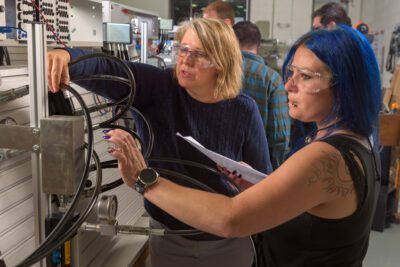
|
|
For individuals ready for career transformation or workforce sectors desperately in need of qualified workers, North Carolina’s community colleges continually rise to the occasion. In fact, North Carolina hosts the nation’s third largest community college system with opportunities close by in every community.
April is Community College Month, so it is the perfect time to commemorate the tremendous value our “Great 58” community colleges bring to our state. As an example of this great work, I’d also like to share some of the achievements of the extraordinary staff, students, benefactors, and partners of Blue Ridge Community College from the past year.
ROI for graduates
In education, we like to talk about the idea of “investing in yourself,” and this concept implies a return on that investment (ROI) in the form of knowledge, skills and — in time — financial reward. Financially speaking, it’s hard to beat the ROI of a two-year community college, because we do everything we can to reduce financial barriers to entry, making higher education available to people from all backgrounds and socioeconomic situations. Whether they are pursuing a workforce credential or planning to transfer to a four-year university, community colleges help students avoid debt.
But if a lower price tag is not enough, community colleges also offer countless local, state, and federal financial aid packages. At Blue Ridge, we offer over 200 scholarships through our Educational Foundation. Statewide, our community colleges and public universities are now promoting the Next NC Scholarship program, designed for students from families with lower incomes, and providing funds which do not have to be repaid. For many eligible students, this statewide initiative will fully fund the tuition and fees of a community college education.
Though we’re known for affordability, the training offered at community colleges is anything but cut-rate. A prime example of this is the exemplary performance of Blue Ridge Community College’s 2023 associate degree nursing graduates, 100% of whom passed the National Council Licensure Examination (NCLEX-RN) last year. The pass rate is a reflection of the excellent preparation given to these graduates, who are now qualified to work as registered nurses in a wide variety of health care settings.
Community colleges also leverage relationships with other institutions to give students even more options for programs and savings. At Blue Ridge, we maintain articulation agreements with dozens of respected institutions. This year alone, we have signed several such agreements and renewals, including direct admissions agreements with UNC Asheville, Western Carolina University and Mars Hill University. Agreements like these encourage students to continue their studies after graduating from Blue Ridge, set new academic goals, and leverage the credits they already earned. Blue Ridge currently offers six associate degrees specifically designed for transfer to four-year institutions, allowing students to begin their studies close to home.
Mutual benefit for students and employers
By providing accessible education, North Carolina’s community colleges build the workforce pipeline and benefit employers across all critical sectors. At Blue Ridge, our programs span beyond the classroom into state-of-the-art laboratories and hands-on workforce training in partnership with area employers. Apprenticeship Blue Ridge is a shining example of this work, with the number of apprenticeship pathways growing from three to 15 since 2021. Several of these pathways are specifically designed for the training needs of area employers.
Last year, our ‘Made in Henderson County’ Apprenticeship Program earned the Outstanding Registered Pre-Apprenticeship Program award at the annual ApprenticeshipNC state conference. Blue Ridge was commended for offering students the preparation needed to succeed on-the-job, build confidence, and connect with professionals in the field.
Responding to evolving workplace needs
Another way that we’re preparing students for the modern workplace is through state-of-the-art equipment and learning spaces. Colleges like Blue Ridge are continually seeking external funding to help provide these resources to local communities. For example, in 2023, Blue Ridge received a grant from the North Carolina Community College System (NCCCS) that funded the purchase of a computer numerical control plasma table. The addition of this table greatly expanded our training capabilities for students studying advanced manufacturing, a critical industry with high demand for skilled workers.
This semester, we also began construction on a new automated greenhouse for our horticulture department. This is thanks to a combined $1.25 million provided by the Golden LEAF Foundation and Cannon Foundation, with additional infrastructure support provided by Henderson County. The facility will not only serve our region’s agriculture sector, but will also provide interdisciplinary learning opportunities in cybersecurity, advanced manufacturing, and more.
In a similar vein, our community college leaders are encouraged to seek discussion at the state and national levels to tie funding to critical workforce needs. Examples include the federal Bipartisan Workforce Pell Act and NCCCS’ Propel NC program, both of which were created to increase funding to workforce-focused efforts made by community colleges. In the case of the former, short-term training in skills-based programs could become eligible for Pell Grant funding. I’m encouraged to see these new initiatives taking shape, and through this support, colleges like Blue Ridge would have clearer paths toward creative development of workforce training solutions. Now is the time to realign the community college model to meet workplace needs.
Economic benefit for the surrounding region
I would like to end this discussion of Community College Month where it began: value. In addition to students and employers, community colleges bring value to our state’s economy, as shown by the most recent 2021 Emsi Burning Glass Community College Impact Study.
The study reported that, thanks to community colleges, there was a “positive return on investment for students, taxpayers and society” in the analysis year (FY 2019-2020). Between the operations, construction, payroll, student spending and alumni impact, our community colleges collectively generated $19.3 billion in added income for the state’s economy during the analysis year — 3.4% of the total gross state product of North Carolina. Furthermore, the report stated that “one out of every 19 jobs in North Carolina is supported by the activities of the colleges and their students.” This is just the tip of the iceberg, and as the rest of the study demonstrated, there are many more ways community colleges enrich the state as a whole.
In total, I know I speak for my colleagues in saying that I’m proud to serve North Carolina students by providing an excellent, affordable, accessible and personalized higher education experience. As we look toward the future, community colleges are leading the way by boosting the economy, building the workforce, preparing students for successful careers, and helping create an even better North Carolina for all.





